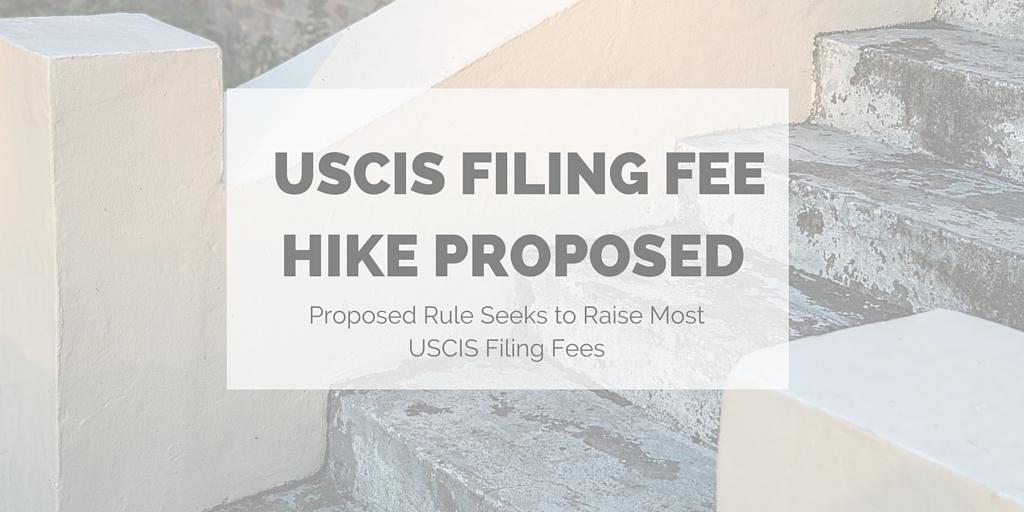USCIS Publishes Rule Seeking to Raise Filing Fees
The Department of Homeland Security has just released a proposed rule seeking to amend (increase) most of the Citizenship and Immigration (USCIS) application filing fees. The weighted average of the increase is 21 percent and USCIS is adding one new fee. The proposed fee increase rule is under a comment period until July 5, 2016 with an anticipated effective date for the new fees around Fall of 2016.
Proposed Fee Increase
The table below highlights the proposed fee increase for the most common types of USCIS filings.
| Form | Current Fee | Proposed New Fee | Increase ($) | Increase (%) |
|---|---|---|---|---|
| I-90 Green Card Replacement | $365 | $455 | $90 | 25% |
| I-129 Nonimmigrant Worker (H-1B, L-1, O-1, etc.) | $325 | $460 | $135 | 42% |
| I-130 Immigrant Petition/Family | $420 | $535 | $115 | 35% |
| I-131 Travel Document (advance parole, reentry permit) | $360 | $575 | $215 | 60% |
| I-140 Immigrant Petition/Employment | $580 | $700 | $120 | 21% |
| I-290B Notice of Appeal or Motion | $630 | $675 | $45 | 7% |
| I-485 Adjustment of Status | $985 | $1,140 | $155 | 16% |
| I-539 Change or Extend Status | $290 | $370 | $80 | 28% |
| I-765 EAD | $380 | $410 | $30 | 8% |
| N-400 US Citizenship | $595 | $640 | $45 | 8% |
| USCIS Immigrant Fee | $165 | $220 | $55 | 33% |
| Biometrics Fee | $85 | $85 | No change |
Rationale of Proposed Fee Increase
The proposed rule describes that the reason USCIS is proposing to raise the filing fees is to bring the fees in line with the actual and anticipated costs of USCIS providing the applicable services. USCIS is a fee-funded agency and it is required to evaluate periodically its fees in order to ensure proper national security, staffing and processing goals milestones. By proposing the fee increase, USCIS aims to close an estimated annual shortfall of $560 million caused mainly due to increased USCIS costs. Simply put, the fee increase is intended to reflect USCIS’s increased case processing costs.
Rule Subject to Public Comment – Effective Date Anticipated in Fall of 2016
Please note that the rule is under public comment period until July 5, 2016. USCIS will then review the comments received in response and consider adjustments to the proposed rule. Once USCIS publishes the final rule, likely in summer or early fall, it is expected to become within 60 days. In other words, we expect that these new fees would become effective in the Fall of 2016.
Conclusion
Many of our readers and especially those who are frequent filers (corporate clients, mainly) will not be very happy with the prospect of having to pay an (significantly) increased fee; however, the last fee increase was in 2010 and we hope that the fee increase would help bring down the processing times for a number of types of applications.
We urge our clients to consider making plans to file any upcoming applications before the new fees are to become effective later in 2016. We invite you to subscribe to our free weekly immigration newsletter to receive timely updates on this and related topics. We also invite you to contact us if our office can be of any assistance in your immigration matters or you have any questions or comments about the 2016 USCIS fee increase.
Related News and Articles
The Capitol Immigration Law Group has been serving the business community for over 15 years and is one of the most widely respected immigration law firms focused solely on U.S. employment-based immigration. Disclaimer: we make all efforts to provide timely and accurate information; however, the information in this article may become outdated or may not be applicable to a specific set of facts. It is not to be construed as legal advice.

